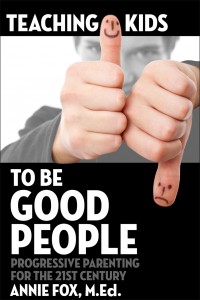The gestation, labor, and heavy pushing are over! On October 3rd at 4:12 PM Teaching Kids to Be Good People was born, you can get your own Kindle version of my book right here. No Kindle? No problem! You can read the book just fine on your Mac, PC, iPod Touch, iPad, iPhone, Android, Blackberry, and Windows Phone 7 with this free Kindle Reader app. Or you can get the print edition here.
Why does anyone write a book? Serious writing can I can seriously tie your brain in knots so why go through that? I can only speak for myself. Part of it is for the glory. (I’m being honest because it’s the only way I know how to write.) When I hold one of my book and I read (great) reviews, I’m thrilled. And for that moment, I’m proud of what I’ve produced. I’m feeling that way now.
After 15 years of answering teen email, I’m convinced that many kids are missing the piece that motivates them to do the right thing. When their education primarily comes from their equally clueless peers, they’re in trouble. And so are we all. That’s why I wrote the book and why you need to read it. Our kids need us to help them develop a moral compass. And we need to do a much better job teaching them how.
Not all teachers are parents, but all parents are teachers. That’s convenient since positive character traits are teachable skills that need to be learned at home as well as at school. When we teach kids to be good people, we help the world become a safer, saner, more accepting place for all of us.
How do you define a “good person?” That’s precisely what I wanted to find out, so I crowdsourced the answer from hundreds of parents, therapists, counselors, educators and teens. Eight concepts kept reappearing in their thoughtful replies: Emotional intelligence, ethics, help, forgiveness, compassion, empathy, acceptance, and social courage—all essential, teachable skills. Teaching Kids to Be Good People will help you teach these skills to your children and/or your students. Hopefully, you will become so engaged in this process that you will inspire all the kids in your life to consciously choose to be kinder to one another.
I think of it as doing my bit for world peace. Does that work for you?













